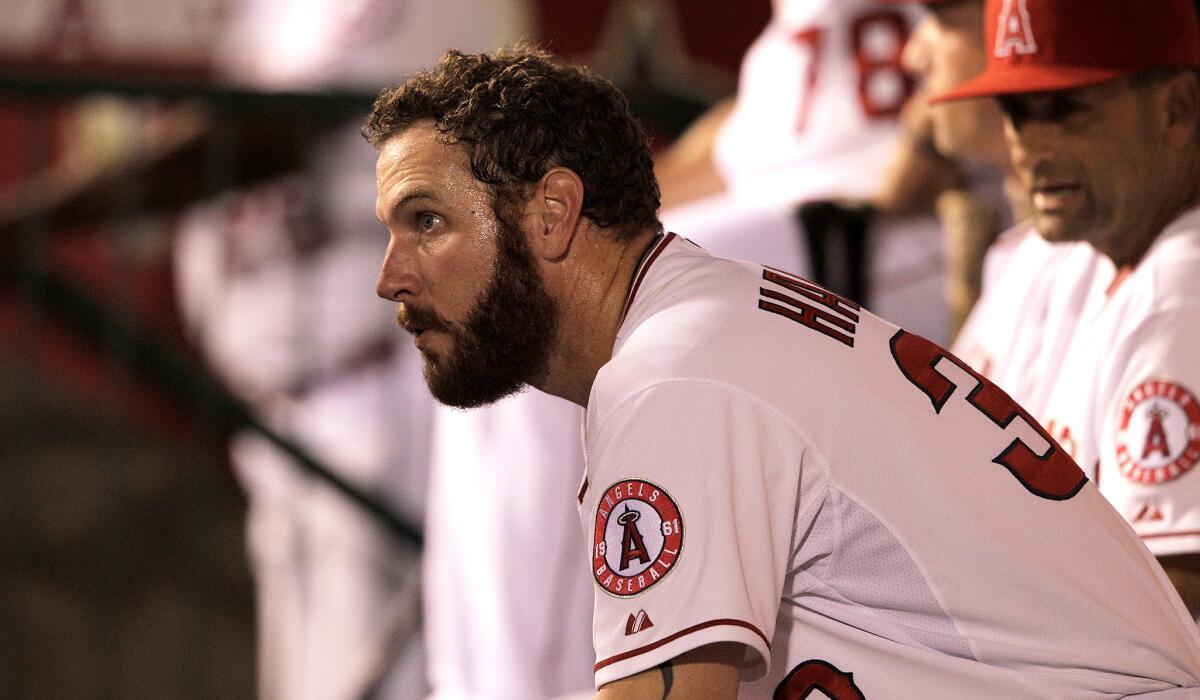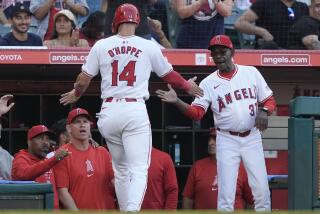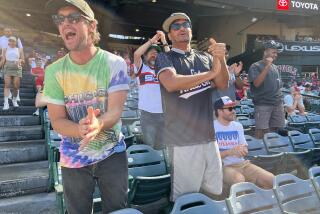Column: Josh Hamilton needs a positive outcome like Don Newcombe’s

Two years ago he stood on the precipice of the Happiest Place on Earth.
It was Christmas time at a Downtown Disney restaurant in Anaheim, and Josh Hamilton was the star of an Angels’ welcoming party that felt like a giant hug. There was a red carpet, twinkling lights, finger food, and Hamilton aw-shucks-ing his way through a narrative of redemption and rebirth.
Arte Moreno, the Angels owner who had just agreed to give $125 million to a player whose career had been derailed three times in a fight against drug and alcohol addiction, was beaming.
“The reality is, at the end of the day, people want hope,” Moreno said. “I look at this positively and I said, ‘I hope.’ ”
Hamilton, a former American League most valuable player who had 43 home runs and 128 runs batted in the previous season in Texas, was thankful.
“Obviously, I have a past history of making mistakes, drugs and alcohol and all that,” he said. “I’m so happy to see and hear an organization say, ‘We’re so excited and happy we got you, no matter what the risk is.’ ”
It is entirely possible that at that moment in his professional life, Josh Hamilton had never been surrounded by more love.
Today, he has surely never felt more alone.
Hamilton met with Major League Baseball officials in New York on Wednesday to discuss a confirmed relapse in his fight with substance abuse. It is a violation that could result in a suspension that could sideline him for months. It is a twisting tumble back into an abyss that many hoped he had finally escaped.
Cut the twinkling lights. Throw a match on that risk. Bid farewell to the hope. In two short years, Hamilton has gone from the Happiest Place on Earth to the Saddest Place in Baseball, where today he sits isolated and distrusted, a power-hitting pariah.
The Angels would never admit it, but they probably don’t want him back, and who can blame them? With the acquisition of reliable outfielder Matt Joyce, they don’t need him. They also don’t need the weight of his giant contract, and could use the enormous suspension savings from the remaining $90 million on his deal to acquire a veteran at the trading deadline. Did anyone think it was just coincidental that, even before his meeting in New York, the Angels didn’t even bother to give him a spring-training locker? He has been rehabilitating his surgically repaired shoulder at a friend’s ranch in Houston, but still.
The fans who once gave him standing ovations also don’t seem to want him back. He was booed mercilessly in October when he was hitless in 13 playoff at-bats and displayed body language that some interpreted as apathy. He has become a virtual outcast in Anaheim after supplying essentially only one year of projected production in his two Angels seasons, with 31 home runs, 123 RBIs and 84 games on the sidelines because of injury during that time.
“He’s washed up and, in my opinion, it’s selfish of him to continue to try playing,” wrote one fan on a team message board.
“If he attempts to come back, his first at-bat in Anaheim would be brutal,” wrote another fan.
His demons are winning, their venom is spewing everywhere, some say he should quit, others say he should toughen up, nobody seems to agree on exactly what should happen to a man who has broken the trust of so many. The 33-year-old Hamilton has become such an object of scorn and despair that it’s enough to make one weep.
Which is exactly what Southern California’s most noted recovering alcoholic baseball star did.
Don Newcombe, the legendary Dodgers pitcher who has been sober since 1967, said that while laying in his bed reading recent stories about Hamilton, he cried.
“I know a little bit about what he’s going through,” said Newcombe, 88. “It made me very, very sad.”
Newcombe and Hamilton met a couple of years ago during a brief meeting in a Dodger Stadium dugout. Newcombe offered to listen if Hamilton ever needed to talk, but the two men haven’t talked since.
When reading about Hamilton’s latest problems, Newcombe said he felt such a connection with his kindred spirit, he gave an impromptu sermon even though he knew Hamilton would never hear it.
“I said out loud, ‘Josh, you need to find out what is really important to you, and be man enough to figure out how to fix it, because you could lose everything. This is a disease, and you need to stand up on your two strong legs and fight it for yourself and all the people who trusted you,’ ” Newcombe said.
Newcombe said that while he didn’t know Hamilton’s exact situation — who does? — he didn’t think retiring was the answer.
“Obviously, if he is this wracked up over baseball, if that’s the bottom line, then he needs to quit,” Newcombe said. “But I think he’ll find baseball is like any other job, he is going to have daily stresses. And his quitting is not going to help him, not help his wife, not help his children, and not help the Angels.”
Newcombe remembers his sobriety began in 1967, at age 41, after Buzzy Bavasi told him the Dodgers no longer had any use for him in the organization, making him an outcast like Hamilton. Newcombe said his defining moment occurred on his knees while holding his young son and praying for strength.
“I said, ‘God, I swear, if you allow me to get up off my knees, I promise you the head of my son I will never take another drink,’ ” he said. “And I never did.”
Here’s hoping Josh Hamilton can finally find one of those moments somewhere in his darkness. He doesn’t need to return to the Happiest Place on Earth. It will be blessing enough if he can find a place that will give him peace.
More to Read
Go beyond the scoreboard
Get the latest on L.A.'s teams in the daily Sports Report newsletter.
You may occasionally receive promotional content from the Los Angeles Times.







